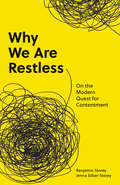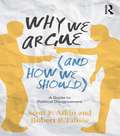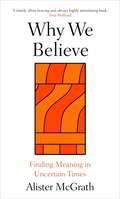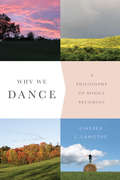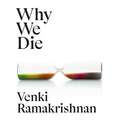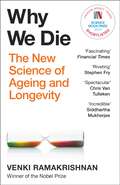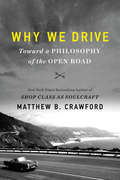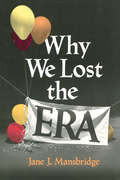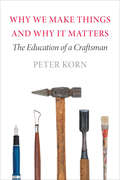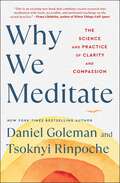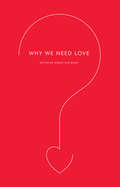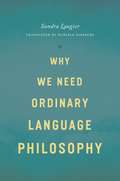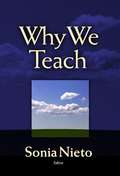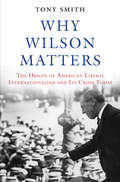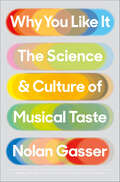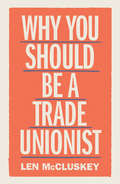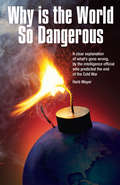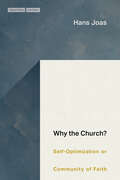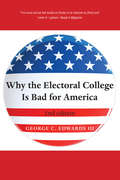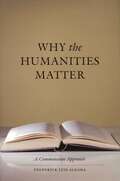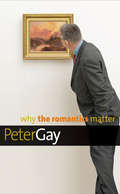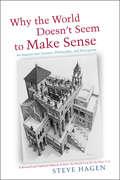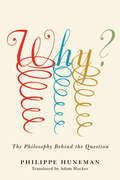- Table View
- List View
Why We Are Restless: On the Modern Quest for Contentment (New Forum Books #65)
by Benjamin Storey Jenna Silber StoreyA compelling exploration of how our pursuit of happiness makes us unhappyWe live in an age of unprecedented prosperity, yet everywhere we see signs that our pursuit of happiness has proven fruitless. Dissatisfied, we seek change for the sake of change—even if it means undermining the foundations of our common life. In Why We Are Restless, Benjamin and Jenna Storey offer a profound and beautiful reflection on the roots of this malaise and examine how we might begin to cure ourselves.Drawing on the insights of Montaigne, Pascal, Rousseau, and Tocqueville, Why We Are Restless explores the modern vision of happiness that leads us on, and the disquiet that follows it like a lengthening shadow. In the sixteenth century, Montaigne articulated an original vision of human life that inspired people to see themselves as individuals dedicated to seeking contentment in the here and now, but Pascal argued that we cannot find happiness through pleasant self-seeking, only anguished God-seeking. Rousseau later tried and failed to rescue Montaigne’s worldliness from Pascal’s attack. Steeped in these debates, Tocqueville visited the United States in 1831 and, observing a people “restless in the midst of their well-being,” discovered what happens when an entire nation seeks worldly contentment—and finds mostly discontent.Arguing that the philosophy we have inherited, despite pretending to let us live as we please, produces remarkably homogenous and unhappy lives, Why We Are Restless makes the case that finding true contentment requires rethinking our most basic assumptions about happiness.
Why We Argue (And How We Should): A Guide to Political Disagreement
by Robert B. Talisse Scott F. AikinWhy We Argue (And How We Should): A Guide to Political Disagreement presents an accessible and engaging introduction to the theory of argument, with special emphasis on the way argument works in public political debate.? The authors develop a view according to which proper argument is necessary for one’s individual cognitive health; this insight is then expanded to the collective health of one’s society.? Proper argumentation, then, is seen to play a central role in a well-functioning democracy.? Written in a lively style and filled with examples drawn from the real world of contemporary politics, and questions following each chapter to encourage discussion, Why We Argue (And How We Should): A Guide to Political Disagreement reads like a guide for the participation in, and maintenance of, modern democracy. An excellent student resource for courses in critical thinking, political philosophy, and related fields, Why We Argue (And How We Should): A Guide to Political Disagreement is an important contribution to reasoned debate.
Why We Believe: Finding Meaning in Uncertain Times
by Prof. Alister McGrathBelief: surely it&’s a relic from the past, a hangover from a superstitious age that is totally out of sync with today&’s rational, science-led culture? 'A timely, often bracing and always highly stimulating book.' Tom Holland, author of Dominion and co-host of The Rest is History In today&’s science-driven, rational world, belief is dismissed as an artefact of a bygone era – something absurd at best, harmful at worst. The prevailing narratives paint belief as primitive, weird, even dangerous. But as life grows ever more confusing and our societies more atomised, contemplating something bigger than ourselves has never been more vital. Alister McGrath offers a fresh perspective on belief, presenting it not as a weakness of rational thought but as an essential tool for navigating uncertainty. Elegant and thought-provoking, Why We Believe reveals how belief provides meaning in the face of existential despair, how it fosters community and offers solace. As society moves beyond the dismissive rhetoric surrounding people of faith, here is a powerful manifesto for the re-enchantment of the Western mind. 'Scholarly, compulsively readable and with gems of information on every page... a must read.' Revd Fergus Butler-Gallie, author of A Field Guide to the English Clergy
Why We Dance: A Philosophy of Bodily Becoming
by Kimerer LaMotheWithin intellectual paradigms that privilege mind over matter, dance has long appeared as a marginal, derivative, or primitive art. Drawing support from theorists and artists who embrace matter as dynamic and agential, this book offers a visionary definition of dance that illuminates its constitutive work in the ongoing evolution of human persons. Why We Dance introduces a philosophy of bodily becoming that posits bodily movement as the source and telos of human life. Within this philosophy, dance appears as an activity that humans evolved to do as the enabling condition of their best bodily becoming. Weaving theoretical reflection with accounts of lived experience, this book positions dance as a catalyst in the development of human consciousness, compassion, ritual proclivity, and ecological adaptability. Aligning with trends in new materialism, affect theory, and feminist philosophy, as well as advances in dance and religious studies, this work reveals the vital role dance can play in reversing the trajectory of ecological self-destruction along which human civilization is racing.
Why We Die: The New Science of Ageing and the Quest for Immortality
by Venki RamakrishnanA major exploration of the science of why and how we age and die - from a Nobel Prize-winning biologist and former president of the Royal Society.'Ramakrishnan's writing is so honest, lucid and engaging' - Siddhartha MukherjeeThe knowledge of death is so terrifying that we live most of our lives in denial of it. Our fear of death has underpinned our religions, inspired our cultures, and also driven our science. Today we are living through a revolution in biology. Giant strides are being made in our understanding of why we age and die, and why some species live longer than others. Immortality, once a faint hope, has never been more within our grasp.Here, Nobel Prize-winning biologist Venki Ramakrishnan offers a definitive look at why we die - and whether we can do anything about it. Covering the recent breakthroughs in scientific research, he examines the cutting edge of efforts to extend lifespan by altering our natural biology and how this raises profound questions. Although we might not like it, might death might serve a necessary biological purpose? And what are the social and ethical costs of attempting to live forever? As science advances, we have much to gain. But might we also have much to lose?Why We Die is a narrative of uncommon insight and beauty from one of our leading public intellectuals.(P) 2024 Hodder & Stoughton Limited
Why We Die: The New Science of Ageing and the Quest for Immortality
by Venki Ramakrishnan'Spectacular. It changed my perspective on the whole living world but most of all myself.' - CHRIS VAN TULLEKEN'Combines science, politics, memoir and medicine with ease, grace and lucidity. An incredible journey.' SIDDHARTHA MUKHERJEE'Utterly fascinating. Clear, enthralling and packed with insights.' - BILL BRYSON'A thrilling ride through the science of ageing and death. A must-read.' - STEPHEN FRY_________Would you want to live forever?Nobel Prize-winning molecular biologist Venki Ramakrishnan transforms our understanding of why we age and die - and whether there's anything we can do about it.We are living through a revolution in biology. Giant strides are being made in our understanding of why we age and die, and why some species live longer than others. Immortality, once a faint hope, has never been more within our grasp.Examining recent scientific breakthroughs, Ramakrishnan shows how cutting-edge efforts to extend lifespan by altering our natural biology raise profound questions. Although we might not like it, does death serve a necessary biological purpose? And how can we increase our chances of living long, healthy and fulfilled lives? As science advances, we have much to gain. But might we also have much to lose?
Why We Drive: Toward a Philosophy of the Open Road
by Matthew B CrawfordFrom the author of the landmark Shop Class as Soulcraft, a brilliant, first-of-its-kind celebration of driving as a unique pathway of human freedom, one now critically threatened by automation. "A thoughtful, entertaining, and substantive work about the joys of driving." —Wall Street JournalOnce we were drivers, the open road alive with autonomy, adventure, danger, trust, and speed. Today we are as likely to be in the back seat of an Uber as behind the wheel ourselves. Tech giants are hurling us toward a shiny, happy “self-driving” future, selling utopia but equally keen to advertise to a captive audience strapped into another expensive device. Are we destined, then, to become passengers, not drivers? Why We Drive reveals that much more may be at stake than we might think.Ten years ago, in the New York Times-bestselling Shop Class as Soulcraft, philosopher-mechanic Matthew B. Crawford—a University of Chicago PhD who owned his own motorcycle shop—made a revolutionary case for manual labor, one that ran headlong against the pretentions of white-collar office work. Now, using driving as a window through which to view the broader changes wrought by technology on all aspects of contemporary life, Crawford investigates the driver’s seat as one of the few remaining domains of skill, exploration, play—and freedom. Blending philosophy and hands-on storytelling, Crawford grounds the narrative in his own experience in the garage and behind the wheel, recounting his decade-long restoration of a vintage Volkswagen as well as his journeys to thriving automotive subcultures across the country. Crawford leads us on an irreverent but deeply considered inquiry into the power of faceless bureaucracies, the importance of questioning mindless rules, and the battle for democratic self-determination against the surveillance capitalists. A meditation on the competence of ordinary people, Why We Drive explores the genius of our everyday practices on the road, the rewards of “folk engineering,” and the existential value of occasionally being scared shitless.Witty and ingenious throughout, Why We Drive is a rebellious and daring celebration of the irrepressible human spirit.
Why We Lost the ERA
by Jane J. MansbridgeIn this work, Jane Mansbridge's fresh insights uncover a significant democratic irony - the development of self-defeating, contradictory forces within a democratic movement in the course of its struggle to promote its version of the common good. Mansbridge's book is absolutely essential reading for anyone interested in democratic theory and practice.
Why We Lost the Sex Wars: Sexual Freedom in the #MeToo Era
by Lorna N. BracewellReexamining feminist sexual politics since the 1970s—the rivalries and the remarkable alliances Since the historic #MeToo movement materialized in 2017, innumerable survivors of sexual assault and misconduct have broken their silence and called out their abusers publicly—from well-known celebrities to politicians and high-profile business leaders. Not surprisingly, conservatives quickly opposed this new movement, but the fact that &“sex positive&” progressives joined in the opposition was unexpected and seldom discussed. Why We Lost the Sex Wars explores how a narrow set of political prospects for resisting the use of sex as a tool of domination came to be embraced across this broad swath of the political spectrum in the contemporary United States.To better understand today&’s multilayered sexual politics, Lorna N. Bracewell offers a revisionist history of the &“sex wars&” of the 1970s, &’80s, and &’90s. Rather than focusing on what divided antipornography and sex-radical feminists, Bracewell highlights significant points of contact and overlap between these rivals, particularly the trenchant challenges they offered to the narrow and ambivalent sexual politics of postwar liberalism. Bracewell leverages this recovered history to illuminate in fresh and provocative ways a range of current phenomena, including recent controversies over trigger warnings, the unimaginative politics of &“sex-positive&” feminism, and the rise of carceral feminism. By foregrounding the role played by liberal concepts such as expressive freedom and the public/private divide as well as the long-neglected contributions of Black and &“Third World&” feminists, Bracewell upends much of what we think we know about the sex wars and makes a strong case for the continued relevance of these debates today. Why We Lost the Sex Wars provides a history of feminist thinking on topics such as pornography, commercial sex work, LGBTQ+ identities, and BDSM, as well as discussions of such notable figures as Patrick Califia, Alan Dershowitz, Andrea Dworkin, Elena Kagan, Audre Lorde, Catharine MacKinnon, Cherríe Moraga, Robin Morgan, Gayle Rubin, Nadine Strossen, Cass Sunstein, and Alice Walker.
Why We Make Things and Why It Matters: The Education of a Craftsman
by Peter KornIn this moving account, Peter Korn explores the nature and rewards of creative practice. We follow his search for meaning as an Ivy-educated child of the middle class who finds employment as a novice carpenter on Nantucket, transitions to self-employment as a designer/maker of fine furniture, takes a turn at teaching and administration at Colorado's Anderson Ranch Arts Center, and finally founds a school in Maine: the Center for Furniture Craftsmanship, an internationally respected, non-profit institution. Furniture making, practiced as a craft in the twenty-first century, is a decidedly marginal occupation. Yet the view from the periphery can be illuminating. For Korn, the challenging work of bringing something new and meaningful into the world through one's own volition – whether in the arts, the kitchen, or the marketplace – is exactly what generates the authenticity, meaning, and fulfillment for which many of us yearn. This is not a "how-to" book in any sense. Korn wants to get at the why of craft in particular, and the satisfactions of creative work in general, to under¬stand their essential nature. How does the making of objects shape our identities? How do the prod¬ucts of creative work inform society? In short, what does the process of making things reveal to us about ourselves? Korn draws on four decades of hands-on experience to answer these questions eloquently, and often poignantly, in this personal, introspective, and revealing book.
Why We Meditate: The Science and Practice of Clarity and Compassion
by Daniel Goleman Tsoknyi RinpocheA practical and soul-stirring guide to meditation that offers a much-needed antidote to the forces of stress that overwhelm so many of us—from the New York Times bestselling author of the &“thoughtfully written, persuasive&” (USA TODAY) Emotional Intelligence and renowned meditation teacher, Tsoknyi Rinpoche.We all experience negative emotions from time to time. But in a world with as much frenzy and pressure as ours, it&’s incredibly easy for these same emotions to become destructive. Now, by blending Eastern tradition with Western science, Why We Meditate effortlessly helps you embrace and understand meditation as never before. With accessible and eye-opening advice based on groundbreaking neuroscience, this guidebook helps you not only break free from negative patterns of thought and behavior but radically embrace your very being. Revolutionize your health, relationships, and soul with this book that is perfect for both serious meditators and those new to the practice.
Why We Need Love
by Simon Van BooyVital insights and wisdom on the perennial question of why we need love This book explores how some of the greatest minds of civilization have tackled a question that continues to play a vital part in our lives today. In Why We Need Love, Simon Van Booy curates an enlightening collection of excerpts, passages, and paintings, presenting works by Geoffrey Chaucer, William Shakespeare, John Donne, William Blake, George Eliot, Emily Dickinson, O. Henry, W. B. Yeats, James Joyce, E. E. Cummings, AnaÏs Nin, Marc Chagall, J. Krishnamurti, and others. Why We Need Love will engage both the serious philosopher and the eternally curious.
Why We Need Love
by Simon Van BooyVital insights and wisdom on the perennial question of why we need loveThis book explores how some of the greatest minds of civilization have tackled a question that continues to play a vital part in our lives today. In Why We Need Love, Simon Van Booy curates an enlightening collection of excerpts, passages, and paintings, presenting works by Geoffrey Chaucer, William Shakespeare, John Donne, William Blake, George Eliot, Emily Dickinson, O. Henry, W. B. Yeats, James Joyce, E. E. Cummings, Anaïs Nin, Marc Chagall, J. Krishnamurti, and others.Why We Need Love will engage both the serious philosopher and the eternally curious.
Why We Need Ordinary Language Philosophy
by Sandra Laugier Translated by Daniela GinsburgSandra Laugier has long been a key liaison between American and European philosophical thought, responsible for bringing American philosophers such as Ralph Waldo Emerson, Henry David Thoreau, and Stanley Cavell to French readersOCobut until now her books have never been published in English. "Why We Need Ordinary Language Philosophy" rights that wrong with a topic perfect for English-language readers: the idea of analytic philosophy. aFocused on clarity and logical argument, analytic philosophy has dominated the discipline in the United States, Australia, and Britain over the past one hundred years, and it is often seen as a unified, coherent, and inevitable advancement. Laugier questions this assumption, rethinking the very grounds that drove analytic philosophy to develop and uncovering its inherent tensions and confusions. Drawing on J. L. Austin and the later works of Ludwig Wittgenstein, she argues for the solution provided by ordinary language philosophyOCoa philosophy that trusts and utilizes the everyday use of language and the clarity of meaning it providesOCoand in doing so offers a major contribution to the philosophy of language and twentieth- and twenty-first-century philosophy as a whole.
Why We Teach
by Sonia NietoThis book includes reflections by teachers who work in U.S. public elementary, middle, and high schools in a variety of settings ,in which they talk about their motivations for coming into teaching, and their thoughts about the profession itself.
Why Wilson Matters: The Origin of American Liberal Internationalism and Its Crisis Today
by Tony SmithThe liberal internationalist tradition is credited with America’s greatest triumphs as a world power—and also its biggest failures. Beginning in the 1940s, imbued with the spirit of Woodrow Wilson’s efforts at the League of Nations to “make the world safe for democracy,” the United States steered a course in world affairs that would eventually win the Cold War. Yet in the 1990s, Wilsonianism turned imperialist, contributing directly to the invasion of Iraq in 2003 and the continued failures of American foreign policy.Why Wilson Matters explains how the liberal internationalist community can regain a sense of identity and purpose following the betrayal of Wilson’s vision by the brash “neo-Wilsonianism” being pursued today. Drawing on Wilson’s original writings and speeches, Tony Smith traces how his thinking about America’s role in the world evolved in the years leading up to and during his presidency, and how the Wilsonian tradition went on to influence American foreign policy in the decades that followed—for good and for ill. He traces the tradition’s evolution from its “classic” era with Wilson, to its “hegemonic” stage during the Cold War, to its “imperialist” phase today. Smith calls for an end to reckless forms of U.S. foreign intervention, and a return to the prudence and “eternal vigilance” of Wilson’s own time.Why Wilson Matters renews hope that the United States might again become effectively liberal by returning to the sense of realism that Wilson espoused, one where the promotion of democracy around the world is balanced by the understanding that such efforts are not likely to come quickly and without costs.
Why You Like It: The Science & Culture of Musical Taste
by Nolan GasserFrom the chief architect of the Pandora Radio’s Music Genome Project comes a definitive and groundbreaking examination of why we respond to music the way we do.Everyone loves music. But what is it that makes music so universally beloved and have such a powerful effect on us? In this sweeping and authoritative book, Dr. Nolan Gasser—a composer, pianist, and musicologist, and the chief architect of the Music Genome Project, which powers Pandora Radio—breaks down what musical taste is, where it comes from, and what our favorite songs say about us. Dr. Gasser delves into the science, psychology, and sociology that explains why humans love music so much; how our brains process music; and why you may love Queen but your best friend loves Kiss. He sheds light on why babies can clap along to rhythmic patterns and reveals the reason behind why different cultures around the globe identify the same kinds of music as happy, sad, or scary. Using easy-to-follow notated musical scores, Dr. Gasser teaches music fans how to become engaged listeners and provides them with the tools to enhance their musical preferences. He takes readers under the hood of their favorite genres—pop, rock, jazz, hip hop, electronica, world music, and classical—and covers songs from Taylor Swift to Led Zeppelin to Kendrick Lamar to Bill Evans to Beethoven, and through their work, Dr. Gasser introduces the musical concepts behind why you hum along, tap your foot, and feel deeply. Why You Like It will teach you how to follow the musical discourse happening within a song and thereby empower your musical taste, so you will never hear music the same way again.
Why You Should be a Trade Unionist
by Len McCluskeyWhy every worker should join a unionIn this short and accessible book, Len McCluskey, General Secretary of Unite the Union, presents the case for joining a union. Drawing on anecdotes from his own long involvement in unions, he looks at the history of trade unions, what they do and how they give a voice to working people, as democratic organisations. He considers the changing world of work, the challenges and opportunities of automation and why being trade unionists can enable us to help shape the future. He sets out why being a trade unionist is as much a political as it is an industrial role and why the historic links between the labour movement and the Labour Party matter. Ultimately, McCluskey explains how being a trade unionist means putting equality at work and in society front and centre-stage, fighting for an end to discrimination, and to inequality in wages and power.
Why is the World So Dangerous
by Herb MeyerThe original version of Why is the World So Dangerous helped change the course of history:"As a friend of Herb, I have long wanted his full story to be told to the public, only to be told by Herb that classification and clearance requirements would prevent him from telling it himself. To Mr. Meyer's great surprise, however, one of the key intelligence documents revealing his historic (and that is not too strong a word for it) contribution to victory in the Cold War has been declassified, and historian Paul Kengor has told the world. In a fascinating article, Prof. Kengor lays out the story of how one man's brilliance changed the world.'There were many behind-the-scenes players who performed critical roles that have never seen the light of a historian's word processor. Here I'd like to note one such player: Herb Meyer. Specifically, I'd like to highlight a fascinating memo Meyer wrote eight years before the Soviet collapse.From 1981 to 1985, Meyer was special assistant to the Director of Central Intelligence, Bill Casey, and vice chairman of the CIA's National Intelligence Council. In the fall of 1983, he crafted a classified memo titled, "Why Is the World So Dangerous?" The memo has eluded historians, which is a shame. It ought to rank among the most remarkable documents of the Cold War.'"Thomas LifsonEditor and Publisher, The American ThinkerSo will this new version:You cannot win by playing defense. When you play defense, the best you can hope for is to keep a bad situation from getting too much worse...We've gone from a culture that values hard thinking, to a culture that tolerates soft thinking....Soft thinking has had a crippling effect on our politics and on our foreign policies...we're doing things that cannot possibly work....The US has gone from being the world's leader, to being just another big country.... and the alternative to American power isn't shared responsibility.It's global chaos.
Why the Church?: Self-Optimization or Community of Faith (Cultural Memory in the Present)
by Hans JoasWhy did Christianity produce the special organizational form "church" in the first place? Is it possible to be a Christian without the church? To what extent is Christian faith in community with other believers an alternative to the mere self-optimization of individuals? In this accessible and questioning new work, Hans Joas traverses theological, church-historical, sociological, and ethical territory in search of a viable conception of the church adequate to contemporary globalized societies. Across eleven essays that draw on work by Ernst Troeltsch, Max Weber, Emile Durkheim, H. Richard Niebuhr, Leszek Kolakowski and others, Joas reflects on key debates—from the failure of so-called secularization theory to explain religiosity in modern society, to the role of Christianity and the church in relation to rampant nationalism and refugee crises, and to the question of whether or not human dignity ever was, or still is, the highest value in the West. Addressing the sociology of the church as the distinctive communal formation of Christianity for the last two millennia, Joas underscores the need for Christian conceptions of church to balance theological sensibility with concrete sociological grounding. In the process, he considers the relation of a community of faith to contemporary ideas about the optimization of life.
Why the Electoral College Is Bad for America
by George C. Edwards IIIAmericans currently choose their president through the electoral college, an extraordinarily complex mechanism that may elect a candidate who does not receive the most votes. In this provocative book, George Edwards III argues that--contrary to what supporters of the electoral college claim--there is no real justification for a system that might violate majority rule. Drawing on systematic data, Edwards finds that the electoral college does not protect the interests of small states or racial minorities, does not provide presidents with effective coalitions for governing, and does little to protect the American polity from the alleged harms of direct election of the president. In fact, the electoral college distorts the presidential campaign so that candidates ignore most small states and some large ones and pay little attention to minorities, and it encourages third parties to run presidential candidates and discourages party competition in many states. Edwards demonstrates effectively that direct election of the president without a runoff maximizes political equality and eliminates the distortions in the political system caused by the electoral college.
Why the Humanities Matter: A Commonsense Approach
by Frederick Luis AldamaIs there life after postmodernism? Many claim that it sounded the death knell for history, art, ideology, science, possibly all of Western philosophy, and certainly for the concept of reality itself. Responding to essential questions regarding whether the humanities can remain politically and academically relevant amid this twenty-first-century uncertainty, Why the Humanities Matter offers a guided tour of the modern condition, calling upon thinkers in a variety of disciplines to affirm essential concepts such as truth, goodness, and beauty. Offering a lens of "new humanism," Frederick Aldama also provides a liberating examination of the current cultural repercussions of assertions by such revolutionary theorists as Said, Foucault, Lacan, and Derrida, as well as Latin Americanists such as Sommer and Mignolo. Emphasizing pedagogy and popular culture with equal verve, and writing in colloquial yet multifaceted prose, Aldama presents an enlightening way to explore what "culture" actually does--who generates it and how it shapes our identities--and the role of academia in sustaining it.
Why the Romantics Matter
by Peter GayWith his usual wit and élan, esteemed historian Peter Gay enters the contentious, long-standing debates over the romantic period. Here, in this concise and inviting volume, he reformulates the definition of romanticism and provides a fresh account of the immense achievements of romantic writers and artists in all media. Gay's scope is wide, his insights sharp. He takes on the recurring questions about how to interpret romantic figures and their works. Who qualifies to be a romantic? What ties together romantic figures who practice in different countries, employ different media, even live in different centuries? How is modernism indebted to romanticism, if at all? Guiding readers through the history of the romantic movement across Britain, France, Germany, and Switzerland, Gay argues that the best way to conceptualize romanticism is to accept its complicated nature and acknowledge that there is no "single basket" to contain it. Gay conceives of romantics in "families," whose individual members share fundamental values but retain unique qualities. He concludes by demonstrating that romanticism extends well into the twentieth century, where its deep and lasting impact may be measured in the work of writers such as T. S. Eliot and Virginia Woolf.
Why the World Doesn't Seem to Make Sense: An Inquiry into Science, Philosophy, and Perception
by Steve HagenThe bestselling author of Buddhism Plain and Simple ponders what we truly know about reality. Why the World Doesn&’t Seem to Make Sense is an eminently down-to-earth, practical, and non-technical response to the urgent questions posed by contemporary science and philosophy. This revised and updated edition of How the World Can Be the Way It Is includes new scientific understanding and clarification of some of its more complex ideas. Steve Hagen aims for an intelligent general audience not necessarily familiar with modern or classical physics, philosophy, or formal logic. Hagen takes us on a journey that examines our most basic assumptions about reality and carefully addresses the &“paradoxes of the one and the many&” that other works only identify. His primary purpose is to help us to perceive the world directly—as it is, not how we conceive it to be. Through this perception each of us can answer profound moral questions, resolve philosophical and ethical dilemmas, and live lives of harmony and joy. Praise for Why the World Doesn&’t Seem to Make Sense &“For those who are certain that objectivity and intellect are the ground floor of all knowledge, this can be a valuable tripe to the sub-basement.&” —Robert Pirsig, author of Zen and the Art of Motorcycle Maintenance &“An unusually stimulating and exhilarating book, of profound value to those seeking to clarify the essential nature of everyday existence—in short, all of us.&” —Peter Matthiessen, author of The Snow Leopard &“Read this book: it will change how you look at things.&” —Nick Herbert, PhD, author of Quantum Reality &“Hagen cuts cleanly through the duality of mind and body, perception and conception, science and religion, and takes us on a spell-binding journey through what we know—and what we only think we know—that ultimately provides a fresh, effective, and remarkably simple grounding for our lives. . . . Original, breathtaking, and beautiful.&” —Natalie Goldberg, author of Writing Down the Bones
Why?: The Philosophy Behind the Question (Square One: First-Order Questions in the Humanities)
by Philippe HunemanA philosopher explores the many dimensions of a beguilingly simple question. Why did triceratops have horns? Why did World War I occur? Why does Romeo love Juliet? And, most importantly, why ask why? Through an analysis of these questions and others, philosopher Philippe Huneman describes the different meanings of "why," and how those meanings can, and should (or should not), be conflated. As Huneman outlines, there are three basic meanings of why: the cause of an event, the reason of a belief, and the reason why I do what I do (the purpose). Each of these meanings, in turn, impacts how we approach knowledge in a wide array of disciplines: science, history, psychology, and metaphysics. Exhibiting a rare combination of conversational ease and intellectual rigor, Huneman teases out the hidden dimensions of questions as seemingly simple as "Why did Mickey Mouse open the refrigerator?," or as seemingly unanswerable as "Why am I me?" In doing so, he provides an extraordinary tour of canonical and contemporary philosophical thought, from Plato and Aristotle, through Descartes and Spinoza, to Elizabeth Anscombe and Ruth Millikan, and beyond. Of course, no proper reckoning with the question "why?" can afford not to acknowledge its limits, which are the limits, and the ends, of reason itself. Huneman thus concludes with a provocative elaboration of what Kant called the "natural need for metaphysics," the unallayed instinct we have to ask the question even when we know there can be no unequivocal answer.
